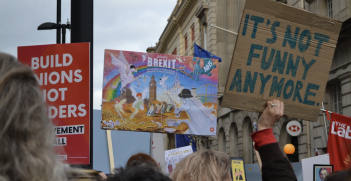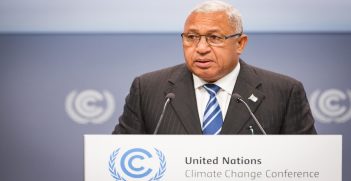Europe Observed: Brexit on the Back Burner

It has been a busy few weeks in UK politics and there have been some interesting developments that (finally) aren’t all about Brexit.
The editorial board of The Financial Times, the most international and arguably the most authoritative of Britain’s newspapers, opined last weekend that the Brexit referendum vote three years ago brought “division, discontent and dysfunction,” declaring that something is wrong in Britain’s political system. Few in Europe would disagree.
Now owned by Nikkei, a Japanese media corporation, the London-based FT argues that the cracks that have been exposed in the political system will take years to repair. That may well be the case, but these very cracks have also revealed some chinks of light that signify that all is not lost.
First, the responsibility for the tragic state of affairs described by the FT lies with Britain’s two main parties – the Conservatives who form Government with the votes of Northern Ireland’s Democratic Unionist Party and the Opposition Labour party. The good news is that both were heavily punished by the public in the English local government elections. The Tories lost 1,334 councillors, its worst showing since 1995. Labour, which had bragged that it would gain more than 400 new council members, recorded a net loss of 82 seats. The pro-Brexit UK Independence Party found its representation on local councils decimated. The clear winners were the centre-left Liberal Democrats, up 703; the Greens, up 194, and Independents who gained 662 seats.
The Lib-Dems and the Greens are staunchly anti-Brexit, and their spectacular success may well be repeated in European parliamentary elections on May 23. This has led many to conclude there is a strong case for a second Brexit referendum.
Prime Minister Theresa May would have none of it. She told the Welsh Conservatives in Llangollen: “I think there was a simple message to both us and the Labour Party: ‘Just get on and deliver Brexit’.”
To that end, the government and opposition have resumed talks to try to hammer out a compromise on the Prime Minister’s thrice-rejected Brexit withdrawal agreement. A compromise would have to involve Britain remaining in the European Customs Union and embrace many aspects of the Single Market, a red line that May said as recently as mid-March she could not cross. Yet ten members of her cabinet favour such a compromise, with varying degrees of enthusiasm. Now May is begging opposition leader Jeremy Corbyn to help get a compromise through the House of Commons. Writing in the Mail on Sunday newspaper she said, “Let’s listen to what the voters said in the local elections and put our differences aside for a moment. Let’s do a deal.”
In the Labour Party opinion is divided as to whether Corbyn should help the Conservatives out of a hole. At least 100 members of parliament have already stated that any compromise would need to be put to a second referendum. But May’s problem now is not Corbyn, but the right-wing of her own party, especially those inside the so-called European Research Group (ERG), one of whom described the prime minister’s move as “a betrayal.” A former Tory leader, Iain Duncan Smith was typical of those venting their anger, saying she should resign this week.
Not that the ERG can draw any comfort from the election results. One of the Lib-Dem’s greatest triumphs was to capture control of Bath and North Somerset, two councils within the constituency of ardent Brexiteer and ERG chairman Jacob Rees-Mogg. When the Lib-Dems captured the Essex city of Chelmsford, thought to be a Brexit stronghold, the local Tory MP burst into tears, a symptom of her party’s frustration.
************************
A most peculiar sacking
The cabinet room at 10 Downing Street probably needs a revolving door, so many of May’s ministers have departed. There have been 12 departures from Cabinet and a total of 48 gone from May’s Ministry. Most have either chosen to go or have been forced out. The former category includes the Prime Minister’s rival, Brexiteer Boris Johnson (whose departure as foreign secretary was a great relief to the diplomatic corps) and the first of May’s three secretaries of state for exiting the European Union, David Davis. Davis, who also nursed an ambition to be prime minister, was a frequent flyer to Europe’s most interesting capitals but showed a marked reluctance to visit the Berlaymont, home of the European Commission in Brussels. He was seldom seen there, and his name is often muttered in less than flattering language.
But the most peculiar departure was May’s sacking of her defence secretary, Gavin Williamson. He was dismissed for allegedly leaking to the Daily Telegraph the decision by the National Security Council to allow the Chinese state-owned company Huawei to help build the UK’s 5G telecoms network. Williamson has not only vigorously denied the allegation but angrily suggested in media interviews that he was the victim of a “vendetta” and tried by a “kangaroo court.”
His reaction was unusual. Most ministers found wanting by their leader tender a polite resignation letter and issue an anodyne statement stating they want to spend more time with their family. Williamson has a young family and has not seen much of them in recent times. Before joining the inner cabinet he was May’s chosen chief whip, using his charm and verbal skills to corral members of a badly split party to support her Brexit manoeuvres. Ironically, in that job, he was the keeper of the government’s secrets and May’s energetic fixer.
There is, of course, much more to this than we have been told. You get a clue of this from the tone of May’s dismissal letter to Williamson, dated 1 May:
“In our meeting this evening, I put to you the latest information from the investigation, which provides compelling evidence suggesting your responsibility for the unauthorised disclosure. No other credible version of events to explain this leak has been identified.
May concludes brutally that she no longer has confidence in Williamson as a cabinet minister, and therefore has asked him to leave. However, the inquiry that led to May’s decision was conducted by cabinet secretary Mark Sedwill who, according to the BBC’s political editor and others, has had a fractious relationship with Williamson.
Some eminent lawyers have argued that if May really believes Williamson leaked the Huawei decision – whereby the UK, unlike Australia, has ignored Washington’s demands to bar Huawei from its infrastructure – she should prosecute him under the Official Secrets Act. Williamson himself has urged the police to investigate if there has been such a breach. The government’s response is “the matter is now closed,” and the Metropolitan Police have said publicly they have no intention of pursuing such an investigation. For now, the matter rests. But Williamson, his career shattered, is determined to find ways to prove his innocence.
************************
Going green
With uncanny timing, the United Nations chose the May Day bank holiday to publish across Europe what is described as the biggest ever study of how humans are ravaging the planet. This follows a week-long conference in Paris of 450 eminent scientists that endorsed the report’s conclusion that more than a million of the planet’s animal and plant species – roughly one in four – are under imminent threat of extinction.
Americans on vacation strolling down the Champs Elysée and pausing at one of those quintessentially French newsstands – would have caught the headline in USA Today “Mother Nature under Attack.” Actually, the report itself was much more hard-hitting than that.
Just a summary of the Global Assessment of Diversity will make unhappy reading for President Donald Trump, whose decision to pull the United States out of the Paris climate change agreement has already enraged environmentalists. The UN report’s 40-page summary is a powerful indictment of how humans have damaged their only home.
Lack of biodiversity is seen to be as a big a challenge to the planet as climate change, as population and economic growth increases demand for food, water and energy to unsustainable levels.
The report calls for “deep and unprecedented change,” including the end of subsidies for farming and the production of fossil fuels, and the replacement of grazing and intensive cropping. It suggests those in wealthier countries should readjust their lifestyles, spending less on luxuries. In a BBC report, World at One presenter Edward Sturton asked both Professor Sir Bob Walker, chairman of the UN Intergovernmental Panel on Climate Change and Matt McGeath BBC environmental correspondent, to describe the scale of the problem.
By coincidence, another report on the parallel issue of curbing emissions and reducing carbon was published last week by the UK’s Committee on Climate Change (CCC). The report, Net Zero, is a blueprint for achieving zero emissions by 2050, and has received an enthusiastic reception across politics, business, media and the wider community.
It calls for Britain to set the pace among G-20 nations by planning for all carbon emissions to be absorbed by vast new forests and technological innovations. It proposes a set of radical and habit-changing ideas, including the planting of three billion trees, incentives to discourage or abandon diesel vehicles, the adoption of electric cars, massive investment in renewable energy, a sharp reduction in the use of oil and gas in both transport and energy generation, and a major drive to improve insulation in homes and buildings. In common with the UN’s Paris report, it wants the acreage of land devoted to animal husbandry and dairy farming cut by 20 percent, a move that would force a change in Britons’ eating habits, as well as disrupting farmers.
If, as looks to be the case, the public is ready to embrace the lifestyle changes necessary to meet the CCC goals, legislation will be required as soon as parliamentary time becomes available. The government has already tightened up the rules controlling fracking and is looking to impose higher tariffs on imported meat. And last week the UK shale gas commissioner, Natasha Engel resigned after only six months in the highly paid government job, saying fracking was being throttled by excessive government regulation. Brexit may be stalled, but there has been plenty else going on in the UK and the environment is a big issue here.
Colin Chapman FAIIA is a writer, broadcaster and public speaker, who specialises in geopolitics, international economics and global media issues. He is a former president of AIIA NSW and was appointed a fellow of the AIIA in 2017.
This article is published under a Creative Commons License and may be republished with attribution.





